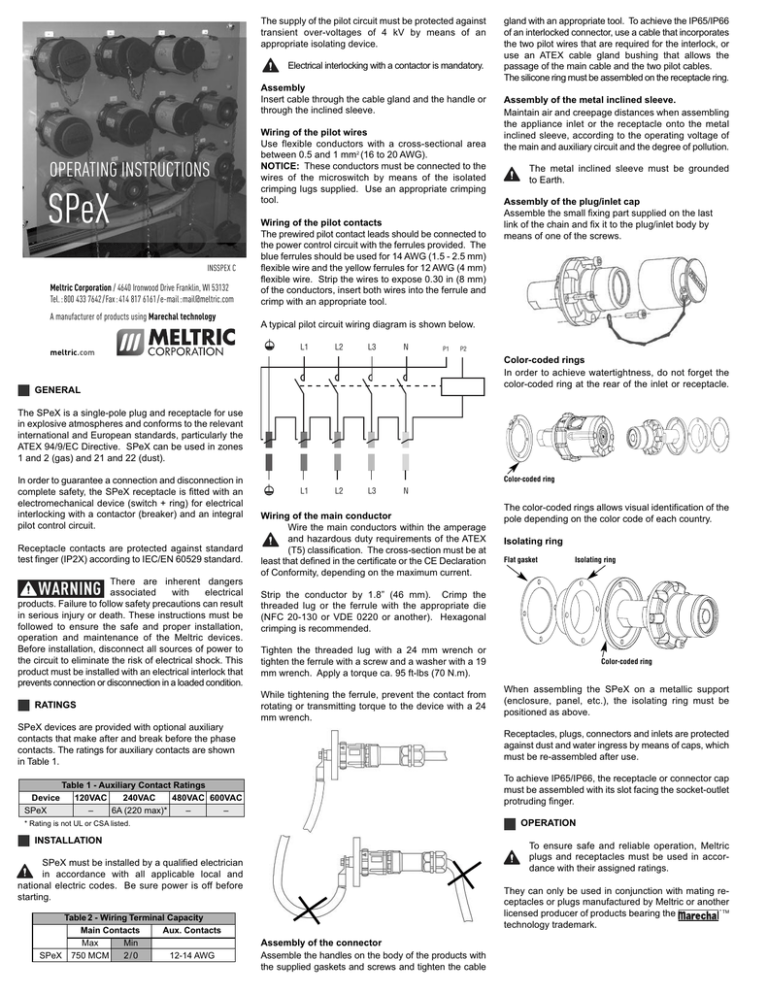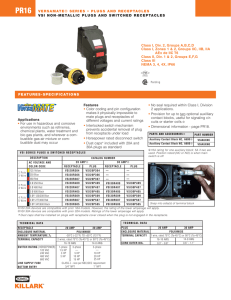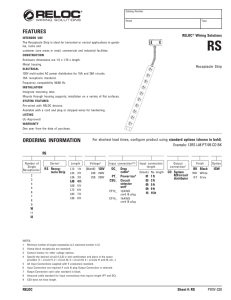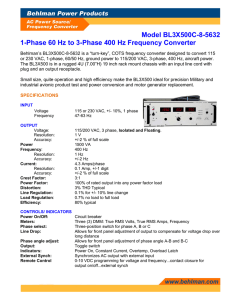SPeX instructions
advertisement

The supply of the pilot circuit must be protected against transient over-voltages of 4 kV by means of an appropriate isolating device. Electrical interlocking with a contactor is mandatory. Assembly Insert cable through the cable gland and the handle or through the inclined sleeve. OPERATING INSTRUCTIONS SPeX INSSPEX C Meltric Corporation / 4640 Ironwood Drive Franklin, WI 53132 Tel. : 800 433 7642 / Fax : 414 817 6161 / e-mail : mail@meltric.com A manufacturer of products using Marechal technology meltric.com Wiring of the pilot wires Use flexible conductors with a cross-sectional area between 0.5 and 1 mm2 (16 to 20 AWG). NOTICE: These conductors must be connected to the wires of the microswitch by means of the isolated crimping lugs supplied. Use an appropriate crimping tool. Wiring of the pilot contacts The prewired pilot contact leads should be connected to the power control circuit with the ferrules provided. The blue ferrules should be used for 14 AWG (1.5 - 2.5 mm) flexible wire and the yellow ferrules for 12 AWG (4 mm) flexible wire. Strip the wires to expose 0.30 in (8 mm) of the conductors, insert both wires into the ferrule and crimp with an appropriate tool. gland with an appropriate tool. To achieve the IP65/IP66 of an interlocked connector, use a cable that incorporates the two pilot wires that are required for the interlock, or use an ATEX cable gland bushing that allows the passage of the main cable and the two pilot cables. The silicone ring must be assembled on the receptacle ring. Assembly of the metal inclined sleeve. Maintain air and creepage distances when assembling the appliance inlet or the receptacle onto the metal inclined sleeve, according to the operating voltage of the main and auxiliary circuit and the degree of pollution. The metal inclined sleeve must be grounded to Earth. Assembly of the plug/inlet cap Assemble the small fixing part supplied on the last link of the chain and fix it to the plug/inlet body by means of one of the screws. A typical pilot circuit wiring diagram is shown below. L1 L2 L3 N L1 L2 L3 N P1 P2 GENERAL Color-coded rings In order to achieve watertightness, do not forget the color-coded ring at the rear of the inlet or receptacle. The SPeX is a single-pole plug and receptacle for use in explosive atmospheres and conforms to the relevant international and European standards, particularly the ATEX 94/9/EC Directive. SPeX can be used in zones 1 and 2 (gas) and 21 and 22 (dust). In order to guarantee a connection and disconnection in complete safety, the SPeX receptacle is fitted with an electromechanical device (switch + ring) for electrical interlocking with a contactor (breaker) and an integral pilot control circuit. Receptacle contacts are protected against standard test finger (IP2X) according to IEC/EN 60529 standard. There are inherent dangers associated with electrical products. Failure to follow safety precautions can result in serious injury or death. These instructions must be followed to ensure the safe and proper installation, operation and maintenance of the Meltric devices. Before installation, disconnect all sources of power to the circuit to eliminate the risk of electrical shock. This product must be installed with an electrical interlock that prevents connection or disconnection in a loaded condition. WARNING RATINGS SPeX devices are provided with optional auxiliary contacts that make after and break before the phase contacts. The ratings for auxiliary contacts are shown in Table 1. Color-coded ring Wiring of the main conductor Wire the main conductors within the amperage and hazardous duty requirements of the ATEX (T5) classification. The cross-section must be at least that defined in the certificate or the CE Declaration of Conformity, depending on the maximum current. Isolating ring Flat gasket Isolating ring Strip the conductor by 1.8” (46 mm). Crimp the threaded lug or the ferrule with the appropriate die (NFC 20-130 or VDE 0220 or another). Hexagonal crimping is recommended. Tighten the threaded lug with a 24 mm wrench or tighten the ferrule with a screw and a washer with a 19 mm wrench. Apply a torque ca. 95 ft-lbs (70 N.m). While tightening the ferrule, prevent the contact from rotating or transmitting torque to the device with a 24 mm wrench. Color-coded ring When assembling the SPeX on a metallic support (enclosure, panel, etc.), the isolating ring must be positioned as above. Receptacles, plugs, connectors and inlets are protected against dust and water ingress by means of caps, which must be re-assembled after use. To achieve IP65/IP66, the receptacle or connector cap must be assembled with its slot facing the socket-outlet protruding finger. Table 1 - Auxiliary Contact Ratings Device 120VAC 240VAC 480VAC 600VAC SPeX – 6A (220 max)* – – OPERATION * Rating is not UL or CSA listed. INSTALLATION To ensure safe and reliable operation, Meltric plugs and receptacles must be used in accordance with their assigned ratings. SPeX must be installed by a qualified electrician in accordance with all applicable local and national electric codes. Be sure power is off before starting. Table 2 - Wiring Terminal Capacity Main Contacts Aux. Contacts Max Min SPeX 750 MCM 2/0 12-14 AWG The color-coded rings allows visual identification of the pole depending on the color code of each country. Assembly of the connector Assemble the handles on the body of the products with the supplied gaskets and screws and tighten the cable They can only be used in conjunction with mating receptacles or plugs manufactured by Meltric or another TM licensed producer of products bearing the technology trademark. connect electrical power to the receptacle to eliminate the risk of electrical shock. Rules applying to products for use in explosive atmospheres impose that any replacement of component must be performed under the control of the manufacturer: Meltric Corporation. Meltric products require little on-going maintenance. However, it is a good practice to periodically perform the following general inspections: 1 Insert the plug straight into the receptacle, until a ‘click’ is heard. NOTICE: The plug and its flexible cable must not exert constraint on the receptacle. • Check the mounting screws for tightness. • Verify that the weight of the cable is supported by the strain relief mechanism and not by the terminal connections. • Check the IP gaskets for wear and resiliency. Replace as required. • Verify the electrical continuity of the ground circuit. • Check the contact surfaces for cleanliness and pitting. Use a clean cloth to rub off deposits of dust or similar foreign materials on the contacts and the plug interiors. Sprays should not be used, as they tend to collect dirt. If any significant pitting of the contacts or other serious damage is observed, the device should be replaced. Any repair or service must be achieved with genuine MANUFACTURER’S RESPONSIBILITY Meltric’s responsibility is strictly limited to the repair or replacement of any product that does not conform to the warranty specified in the purchase contract. Meltric shall not be liable for any penalties or consequential damages associated with the loss of production, work, profit, or any other kind of financial loss incurred by the customer. Meltric Corporation shall not be held liable when its products are used in conjunction with products not TM technology trademark. The bearing the use of Meltric products in conjunction with mating TM techdevices that are not marked with the nology trademark shall void all warranties on the product. It was designed, manufactured and controlled in a strict respect of the relevant international and European standards, laws and directives, and particularly of the ATEX Directive. It bears the CE marking whenever applicable. It also bears its Ex classification. Meltric Corporation is a member of the international association, BECMA: the Butt-contact Electrical Connectors Manufacturers Association. parts only. 2 Pull on the plug to make sure it is properly latched in the receptacle. A small rotation of the plug, in either direction, allows the locking finger of the receptacle to prevent any further rotation. 3 To close the pilot circuit, turn the ring of the receptacle up to the stop towards “1”. Check the continuity of the pilot. Do not attempt to turn the ring toward "1" when there is no plug engaged. Defeating the mechanical lock could create a potentially hazardous or explosive condition if energized under load. 4 To open the pilot circuit and unlock the plug, turn the ring back to “0” up to the stop. Press on the button to release the plug. The caps must then be re-assembled on both sides. MAINTENANCE WARNING Before inspecting, repairing, or maintaining Meltric products, dis- INSSPEX C


